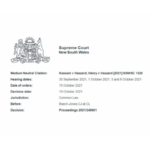Brad Hazzard is Not Fit to Lead the Pandemic Response

Another bizarre and unnecessary verbal attack by a politician has occurred the very week the Set the Standard report has been released, highlighting just how far we have to go in stamping out disrespect and misconduct in the workplace.
NSW Health Minister Brad Hazzard received plenty of backlash on social media over his disdainful treatment of a female journalist during a press conference in Coffs Harbour.
Mr Hazzard has been labelled as ‘unhinged’ and ‘obnoxious’ as a result of his conduct, with many of the view this is just another example of how ‘absolute power corrupts absolutely’.
But in the context of expectations in the workplace, the incident has raised concerns about the normalisation of bullying, harassment and discrimination – including by the ‘leaders’ we elect, pay and expect to look after our interests.
Mockery and ridicule
When ABC Journalist Danuta Kozaki dialled in to the press conference to ask about a number of regional health matters, Mr Hazzard proceeded to mock her.
“Ughh. Someone just said Danuta could ask a question, but that wasn’t me,” Mr Hazzard stated.
After refusing to answer the journalist’s question, insisting she would “go out and say too much” if he did, Mr Hazzard began to suggest her questions were annoying the other people in attendance.
The journalist persisted with professionalism and good manners. And even after she hung up, Mr Hazzard continued to try to make fun of her.
As the story made the rounds of social media, Mr Hazzard’s behaviour was criticised, with some labelling it as “condescending”, “obnoxious”, and even “unhinged”.
In the past 24 hours there has been no public acknowledgement of the incident by Mr Hazzard.
It’s not fair to simply write this off as just the nature of politics, because, after all, journalists and politicians rarely see eye to eye. It’s not fair either to suggest that it’s just ‘an exchange of words’. This is a man in a position of power publicly making fun of another professional as she was trying to do her job.
If Mr Hazzard was aiming for laughs, then the joke has fallen very flat, particularly at a time when the treatment of women in all areas of society is under the microscope, and our politicians in particular are under intense scrutiny.
Bullying and harassment are ‘normalised’ in politics
The Set the Standard report by Sex Discrimination Commissioner Kate Jenkins, released earlier this week, found a poor culture typified by a ‘boys club’ mentality, within Federal politics where bullying and harassment are ‘normalised.’
In other words, there are not just ‘a few bad apples’ within an otherwise good bunch. There are entrenched behavioural norms at play within a culture that not only allows, but perpetuates disrespectful behaviour.
Time and again countless experts have pointed out that disrespect along with over-inflated perceptions of power and abuses of power are key factors which lie at the very core of toxic workplace behaviour.
Misogyny must end
The Hazard incident is not the first of its kind. Earlier this year the Prime Minister himself publicly discredited the former CEO of Australia Post, despite the fact that she had done nothing wrong. This resulted in her leaving a job she loved, and having to deal with the emotional trauma of being nationally humiliated.
This year we’ve also had very serious allegations of sexual assault and sexual misconduct within federal politics.
Unfortunately a sense of entitlement as well as a distinct lack of professionalism and decorum has come to characterise Australian politics and politicians, and it has to stop, not only because it’s incredibly harmful, but because it has broader, perhaps less obvious negative implications for our political processes and our society as a whole.
Australians deserve better
We deserve politicians who understand they work for the public. We need politicians who value the role of the media to ask questions and inform the public of political and social issues.
We also deserve politicians who listen and actively engage in respectful debate, and who understand how vital robust discussion is on topics of importance.
Unfortunately, what we’ve got is a lot of arguing and posturing and horrendously disrespectful, damaging, self-serving behaviour.
This could be one of the reasons why many Australians are so disinterested in politics or view it with such a large degree of apathy, which is detrimental, because it can lead to laws being passed without public inspection or inquiry and inevitably leads to the slow erosion of democracy.







